World Bee Day: Bees under lockdown in London as bacterial disease sweeps capital amid swarm season
Andy Gregory looks at how capital's hidden rooftop honeybee populations are faring during coronavirus pandemic and finds they are dealing with an outbreak of their own

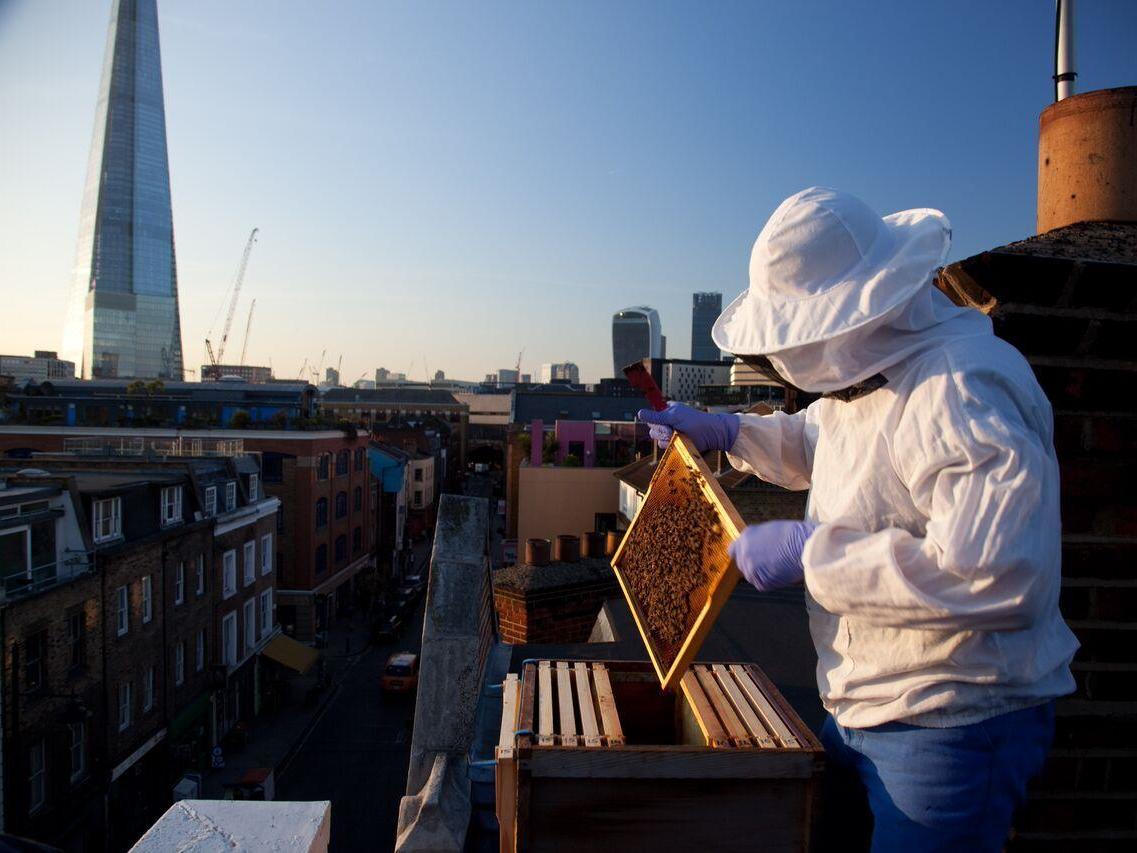
Your support helps us to tell the story
From reproductive rights to climate change to Big Tech, The Independent is on the ground when the story is developing. Whether it's investigating the financials of Elon Musk's pro-Trump PAC or producing our latest documentary, 'The A Word', which shines a light on the American women fighting for reproductive rights, we know how important it is to parse out the facts from the messaging.
At such a critical moment in US history, we need reporters on the ground. Your donation allows us to keep sending journalists to speak to both sides of the story.
The Independent is trusted by Americans across the entire political spectrum. And unlike many other quality news outlets, we choose not to lock Americans out of our reporting and analysis with paywalls. We believe quality journalism should be available to everyone, paid for by those who can afford it.
Your support makes all the difference.“It’s like seeing SWAT squads getting tooled up going in to storm a hostile building,” says beekeeper Dale Gibson, describing the moment when bee inspectors prepare to enter an apiary suspected of infection.
If the hives are found to be compromised, they will be placed on lockdown for a number of weeks, with their entrances shrunk – making it easier for guard bees to police who enters the hive and thus prevent the disease from spreading.
With the vast majority of the city’s nearly 9 million residents living under coronavirus lockdown, London’s beekeepers are contending, not only with the usual trials of summer swarm season, but with their own outbreak of a bacterial infection, known as European Foulbrood (EFB).
While many hives that contract the bacterial infection will recover with a mixture of treatment, regular inspection and good fortune, those that do not will be placed in a hole and incinerated.
If EFB gets into a hive, it infects the youngest, known as larvae, and starves them of nutrition.
“So you end up with non-viable brood that don’t even get past the first stage of development. That’s going to kill a hive, and it’s also very contagious,” says Gibson, founder of multi-award-winning company Bermondsey Street Bees.
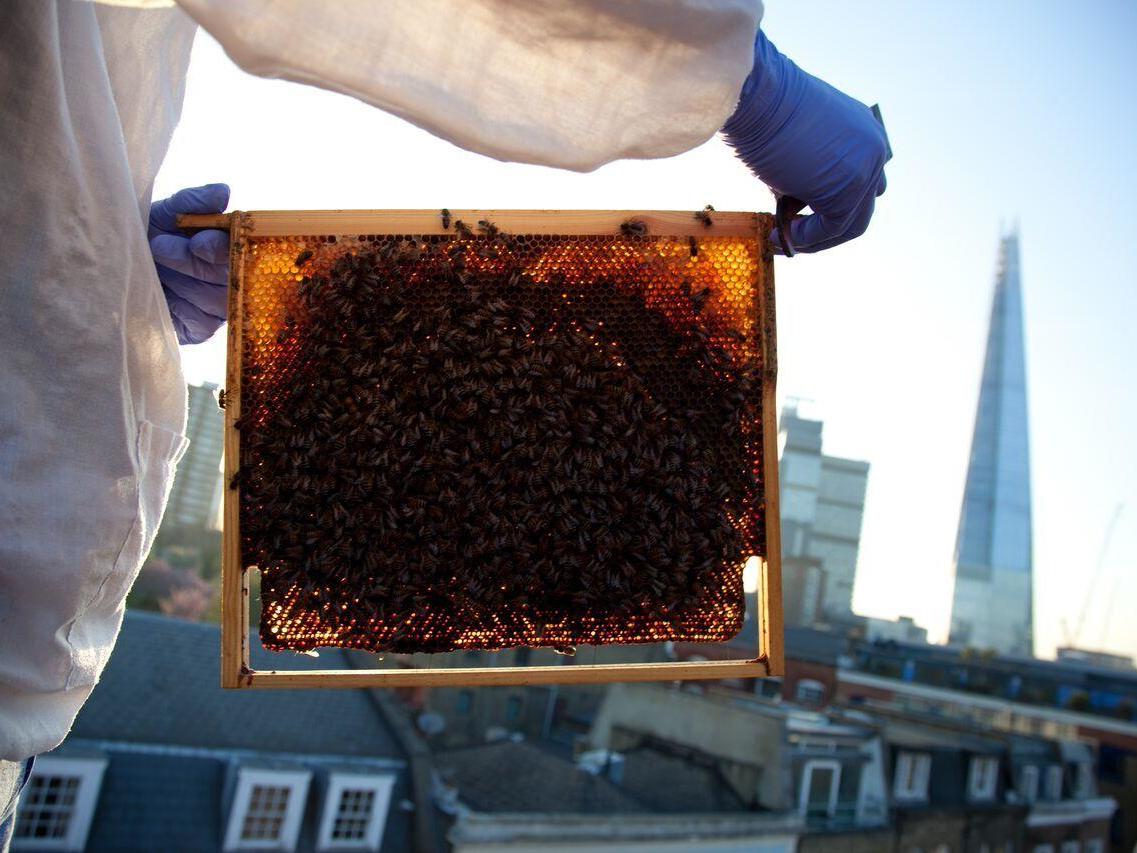
Unbeknown to many of its human residents, the capital has the densest bee population of any city in Europe, and possibly the world.
Likely kept in the city for a millennium – initially by monks who used their wax for candles, and their honey for sustenance and mead – London’s kept honeybee population has tripled in the last decade. By 2019, more than 5,500 hives were registered in the city’s gardens and on rooftops, such as those of St Paul’s Cathedral and the Tate Modern.
In 2015, Greater London had no identified cases of EFB. However in the past three years, it has “gone from virtually nothing to top of the league tables”, Gibson says.
Some 47 colonies were diagnosed in 2019, 34 of which were destroyed as a result, according to the government’s National Bee Unit. There have been 31 diagnoses so far this year – the highest anywhere in England, Scotland and Wales.
“That’s quite an outbreak of a serious notifiable bee disease and here we are living alongside a human epicentre of infection,” Gibson says. ”It is an interesting parallel that although the bees are going about their business normally, there is still a genuine risk of infection, and we should be alert and aware of that as beekeepers.”
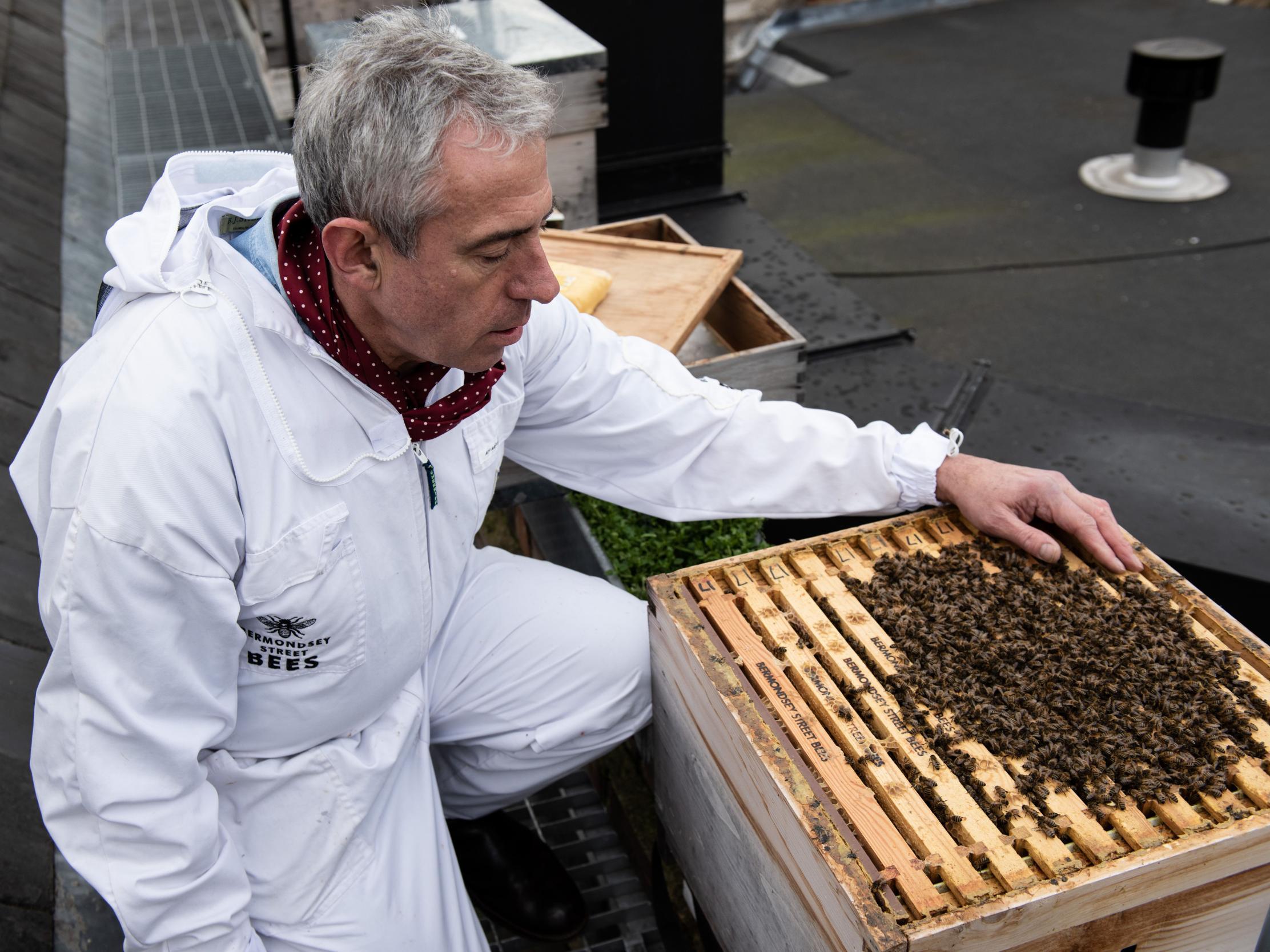
While bees can spread the disease themselves, often by accidentally drifting into other hives, Gibson says it is mostly beekeepers who do so by using the same equipment to inspect different hives.
“That’s why the awareness is so important, rather like social distancing now,” he says. ”It’s just that level of added vigilance and awareness that actually makes the difference to people’s outcomes and it will too if beekeepers are registered with the government, but they just need to be more careful.”
The best protection against further spread of the disease is regular inspection. But while beekeeping has been designated a valid reason for travel during the coronavirus lockdown, the pandemic has – in addition to decimating honey sales – arrived at the start of beekeepers’ busiest season.
From April through until July, bees begin to reproduce and replace their queens, a natural byproduct of which can be “swarming”.
Typically in this process, around half the colony will leave – with most of the honey and a queen – to establish a new hive, moving in a vast swarm consisting of tens of thousands of bees and settling in an intermediate location for up to three days, before the scouts find a more permanent place to live.
Beekeepers carry out regular inspections to stop this process from happening, however there are still considerable swarms across London every year.
When it became apparent that a Covid-19 lockdown was inevitable, beekeepers were quick to warn continued access to their hives was essential.
Gibson, who has apiaries on rooftops and in gardens across London, in historic locations such as the nearly 700-year-old Charterhouse and Lambeth Palace, said that while health and safety checks had increased to ensure social distancing measures were upheld, travelling to access hives had not been a problem.
“Unlike other essential workers, we as beekeepers have pretty full PPE,” he said. “It does make us visible, so that people can see us and understand what we’re doing ... a full body suit, veil and gloves is not a bad start to get around town in the current environment.”
Bermondsey Street Bees also has an apiary at Silverland Quays in London’s Docklands, next to which a car park has been built to cater for ambulances and workers at the NHS Nightingale field hospital.
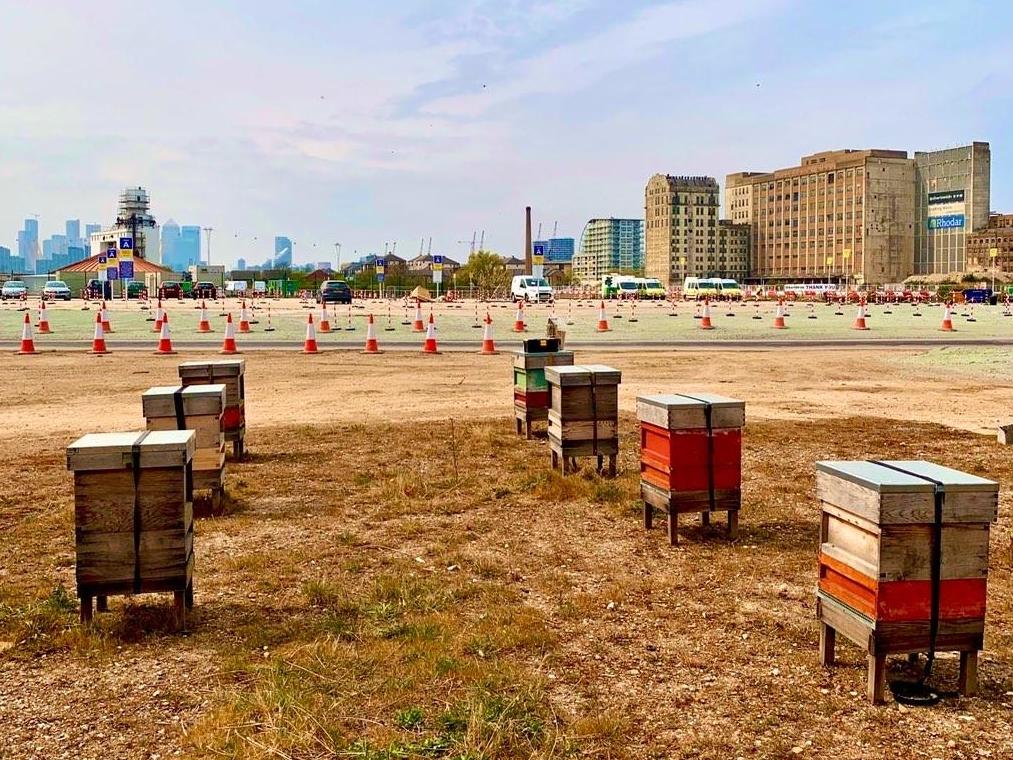
He describes the previously busy industrial site, which was cleared up and left derelict 20 years ago, as a place of “enormous rewilding” where “nature has reasserted itself”, adding: ”You’ve got things like upturned boats with wild bees living in a hole in the hull” and “essentially native pioneer species coming back that normally live on the Thames estuary”.
While much of it has been left untouched, he adds: “It’s been a massive transformation of the environment around our beehives, which sit there quietly busying away no matter what happens around them.
“We were asked whether it would be bad for the bees to have the construction activity and the vehicle activity onsite, and in our experience it makes no difference at all.
“As long as we can have access to the bees to inspect for disease and prevent them from swarming, which can cause a little local disruption because you know, 20,000 bees in the air turning the sky dark and sounding for all the world as if they’re threatening, although that’s not what they’re doing, it’s not what you need in an emergency pandemic situation.”
However, illness and the complications arising from Covid-19 have been a barrier for some beekeepers.
Last week, Gibson received a call from an elderly lady who kept hives in her garden. Her regular beekeeper had been absent, in part due to her being at higher risk of coronavirus, and many of the bees had died.
“A lot of people have had problems with lockdown and casual beekeepers who have switched off because of health fears,” Gibson says, adding: “There are many more swarms, we’re seeing it on Twitter all the time.”
However, London Beekeeper’s Association (LBKA) chair Richard Glassborow disagrees that there has been an increase in swarms this year, and suggests many amateur beekeepers have had more time than usual during lockdown to look after hives.
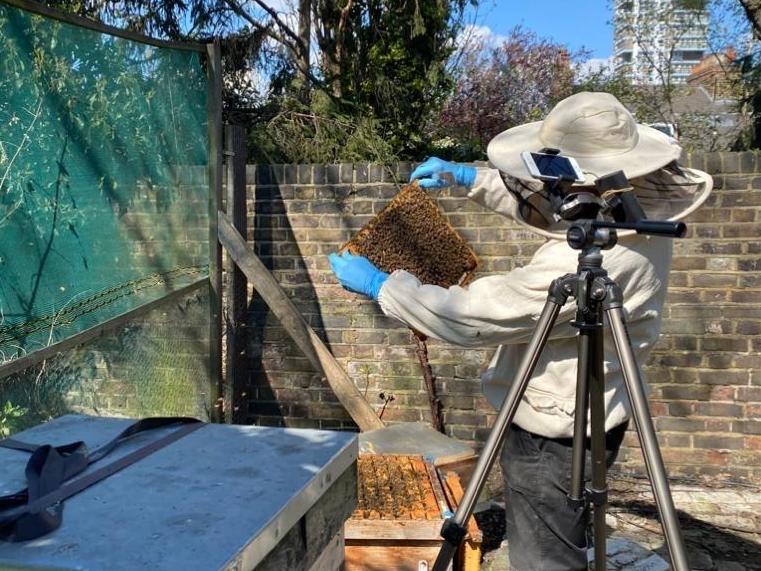
LBKA run a voluntary swarm collection service, and published guidance for members ahead of lockdown saying they were “concerned London’s colonies do not get neglected” as a result of illness, adding: “The prospect of that many swarms going feral is not attractive.”
As a result, they encouraged members to set up networking and “bee-buddy” schemes “to prepare in advance for the possibility that they fall sick and can’t tend them themselves”, which Glassborow says many have done.
He says there has been no notable increase in the requests their members have received to collect swarms.
Once collected, typically in a taped-up cardboard box, swarms also have to be quarantined for several weeks to ensure they are healthy, and LBKA has developed a network of people willing to host a box of bees in their garden to provide “micro-quarantine apiaries”.
Additionally, Glassborow says the lockdown has seen an increase in the LBKA's online mentoring schemes, increasing the level of education readily available for intermediate and high-level beekeepers.
One of the major issues not exceptional to lockdown, Glassborow says, can be people installing hives at their place of work.
“Because it’s a place of work, there is movement – someone changes jobs, moves, and the bees are still there four weeks later,” he says, recalling an instance dealt with by an LBKA member the previous day in which bees had been abandoned four years previously.
Gibson also cited a memorable example during lockdown, in which he was called to rescue two hives from the roof of London’s Roundhouse, recalling: “We were just above the stage door making our entrance and went up on the scissor lift and picked up the hives.”
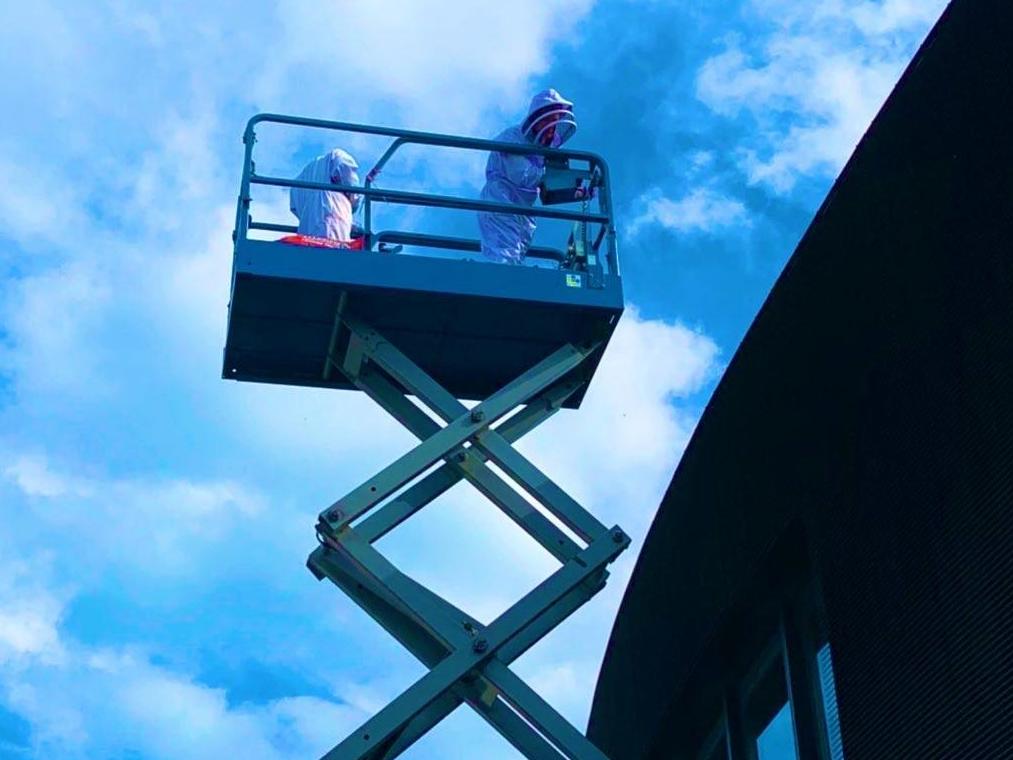
Glassborow adds: “It has consequences – swarming is a natural process from the bees' point of view, its reproduction so it’s a very powerful instinct, but it can be a nuisance.
“It’s quite exciting. They look and sound awesome, but actually they’re very benign because they’re not at home, they have nothing to defend, they’re loved up on tummies full of honey they’re carrying to build their next nest, and it’s an awesome wonder of nature.
“But it’s not really that appropriate for central London. Not least because if we don’t collect them they set up feral colonies, often inside buildings, and they really can be a nuisance and we fear they could be a reservoir of pestilent disease.
However, he says “it’s happening all the time. Not all swarms are successful – they have a high failure rate, but that’s Darwinian evolution for you. You wouldn’t expect them all to succeed”.
He has also noticed an uptick in colonies sending out not one, but four or five smaller swarms – a far rarer phenomenon, which he believes may be a result of this year’s warm weather, which favours bees, and a Darwinian attempt to tip increase the odds of survival.
However, according to the IUCN’s 2015 report, nearly 10 per cent of European bee species are facing extinction. In 2019, WWF found that in the UK, 17 species were regionally extinct, 25 others threatened, and a further 31 species of conservation concern.
While the UN calculates a third of the world’s food depends upon bees, these vital pollinators are often failed by our own agricultural practices, which favour increasingly vast homogenous fields of crops, which leave gorged bee populations to starve once they are harvested.
Although cities such as London can now provide a wider variety of food sources for bees, there are serious concerns that the vast number of urban honeybees are introducing too much competition for wild bees to compete.
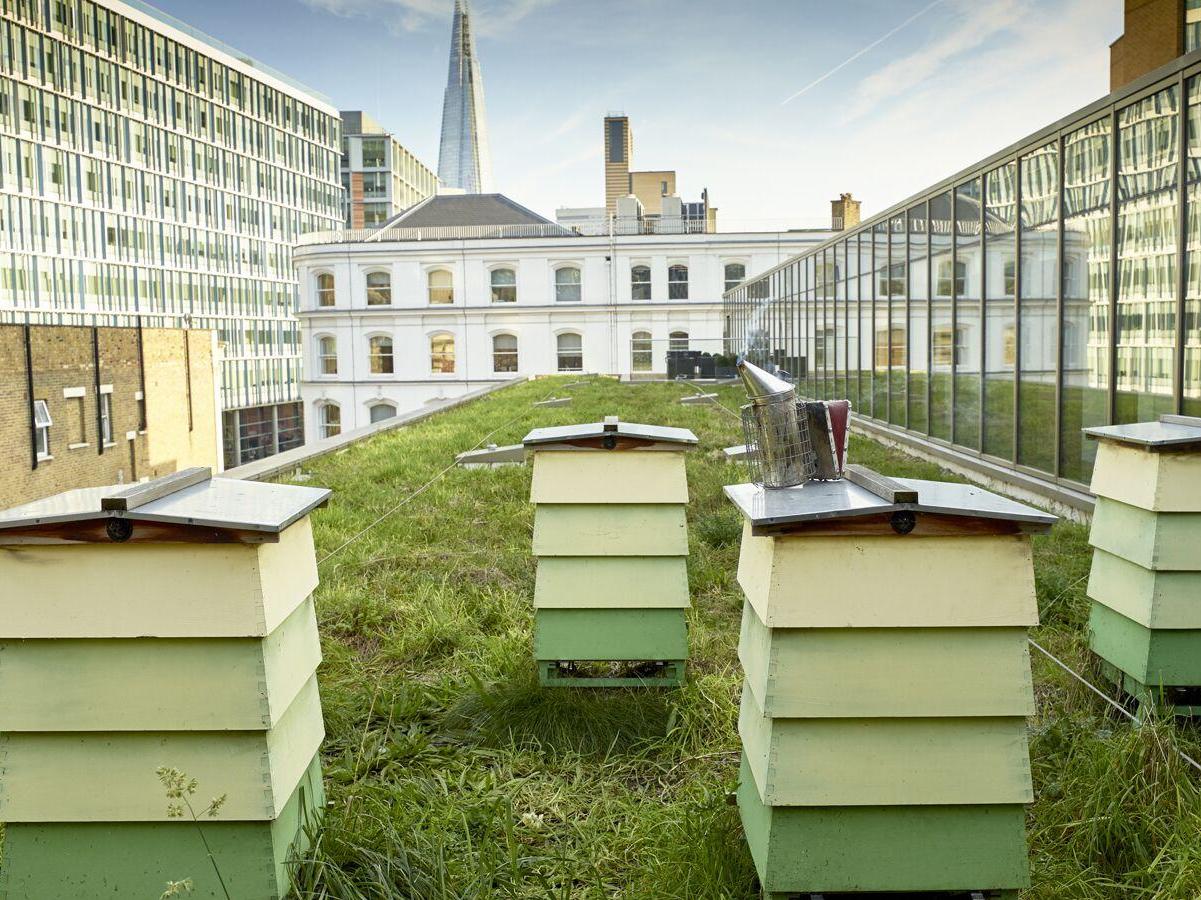
“London is not a homogenous environment, it’s very, very varied,” Glassborow says. “So you’ve got areas where there’s good forage provision and areas where there’s practically none, and that doesn’t correlate with where the bees are distributed.”
He and Gibson – whose company has won prizes for its focus on sustainability – urged those considering introducing new hives to think carefully about whether it was sustainable to do so, and to ensure that sufficient food sources were planted in the area beforehand so as not to further diminish the supply of pollen and nectar available to wild bees.
Asked, in light of World Bee Day, what Londoners could do to help local bee populations, Glassborow says: “If we want to help bees it’s all about flowers ... if every Londoner planted one flower in a pot on their windowsill that’s nine million flowers, which is an environment. It’s very possible to help bees, it’s very, very possible.”
The lockdown already appears to have provided some benefits, with less intrusive land management on the likes of roadside verges giving flowers a chance to bloom – a trend campaigners hope will continue.
Alongside planting herbs and flowers where possible, Gibson suggested getting involved with local planting programmes, or even organising larger-scale efforts and applying for grants to re-adapt public space for planting.
“People have to be opportunistic,” he says. “There is no formula, you just have to look around you and say, ‘where can I make a difference?”
Join our commenting forum
Join thought-provoking conversations, follow other Independent readers and see their replies
Comments